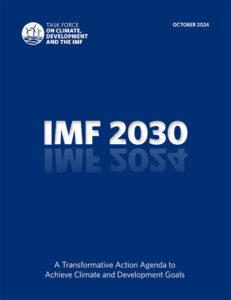 With just six years until 2030, there is an urgent need to unlock investments and mobilize affordable climate finance in a fiscally sound and financially stable manner.
With just six years until 2030, there is an urgent need to unlock investments and mobilize affordable climate finance in a fiscally sound and financially stable manner.
The International Monetary Fund (IMF) has a vital role to play, and proposals to reform the international financial architecture – whether the Bridgetown Initiative, the Paris Pact for People and Planet or the Nairobi Declaration – all involve reforms to the IMF.
Yet, despite notable recent strides, ambition to integrate climate at the Fund remains limited. A transformation of the IMF is necessary for aligning the international financial architecture with shared development and climate change goals.
A new report from the Task Force on Climate, Development and the IMF pushes for a faster and deeper evolution of the IMF that is both development-centered in its approach to climate and embraces an investment push as a priority goal. It presents three core policy recommendations animated by an IMF 2030 Action Agenda, comprised of concrete reforms to be implemented over the next 12 months.
The report calls on IMF Managing Director Kristalina Georgieva to lead this effort and for the Fund to report on the status of progress at the 2025 IMF/World Bank Annual Meetings.
Publication Period: October 2024



